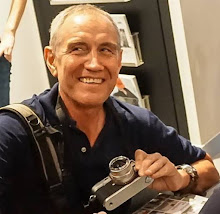here: http://goo.gl/cd5uIe
I have been through the workshop like this and can recommend it to anybody who is into human-interest photography.
Photograph above: © Alex Webb
"...In a distant province, by the sea..."
Emir Shabashvili was born in a small town Yelabuga situated in now obsolete Republic of Soviet Tataria which was in turn part of country named Soviet Union, now also long gone...>>more...
 |
"...Exclusive to United States residents, Try My Photo gives you the opportunity to have one of your favorite images printed for free on either ILFORD GALERIE Prestige Gold Mono Silk 270gsm or Smooth Pearl 310gsm media using a Canon PIXMA Pro series printer. To take advantage of the program visit http://trymyphoto.com/ilford where you can find full details and instructions. Canon selected the two TIPA award winning papers from the ILFORD GALERIE Prestige range to demonstrate the professional-quality printing capabilities of its inkjet printers. Gold Mono Silk, designed for black and white printing, is an exciting new edition to the ILFORD range and has picked up a number of industry awards and accolades including Best Inkjet Photo Paper from TIPA. Smooth Pearl was the 2012 recipient of the TIPA award and is a professional standard media offering superb clarity, high sharpness and excellent colour gamut. To take advantage of this promotion, register online here and follow the instructions. The free 8.5”x11” print will be produced on your chosen Canon PIXMA Pro printer and media and the final print will be mailed directly to you. Offer is limited to one image per printer per paper brand per eligible U.S. household. Offer runs through September 30, 2013. Each Try My Photo print comes with information explaining exactly how the image was printed so you can easily replicate the results using your Canon printer and ILFORD media at home. To ensure accurate reproduction of images in home-printing, you can also download the free ICC profiles for Canon printers from ilford.com" |
Among many pieces of wisdom associated with photography this maxim is one of the oldest and most loved. It had been cited numerous times in many books and articles. I always wanted to know the origin of it, but never been able to get past the few clues available in the open sources: it is anonymous, it is translation from Latin and it is from the old coin of one of the medieval German states (Brunswick). The coin (thaler) presumably dated 1589. Here is the example of such a source:
This is a "quick and dirty" translation from Russian of the article I found in the old "Soviet photo" magazine, issue dated Jan 1934 with portrait of Stalin on its cover (of course, what else?):

Born in 1957 in Soviet
I have been using the media as an amateur for the most of my life and came to a serious photography in late 90s. But it had not become my passion until after moving from Russia to the USA I started the “Walking downtown” project related to the urban environments and to the interaction of humankind with the “machine” it build to “live in”.
The project had resulted in 2 books I have published:
“La Machine a Habiter”
"Selected photographs"
I have never stopped and still working today along the same lines.
The primary subject is an American downtown as a place where nothing considered to be permanent and indispensable, where people seem to be small and unimportant part of the structure, almost parasites in the huge body made of white metal, dark glass and artificial stone.
The only way one survives in this strange machine is by carrying a home, the real one – inside. We carry our homes like hermit-crab carries its shell. I know this because I am the one who still carries the same one‑story wooden house with extra attic room once been mine...